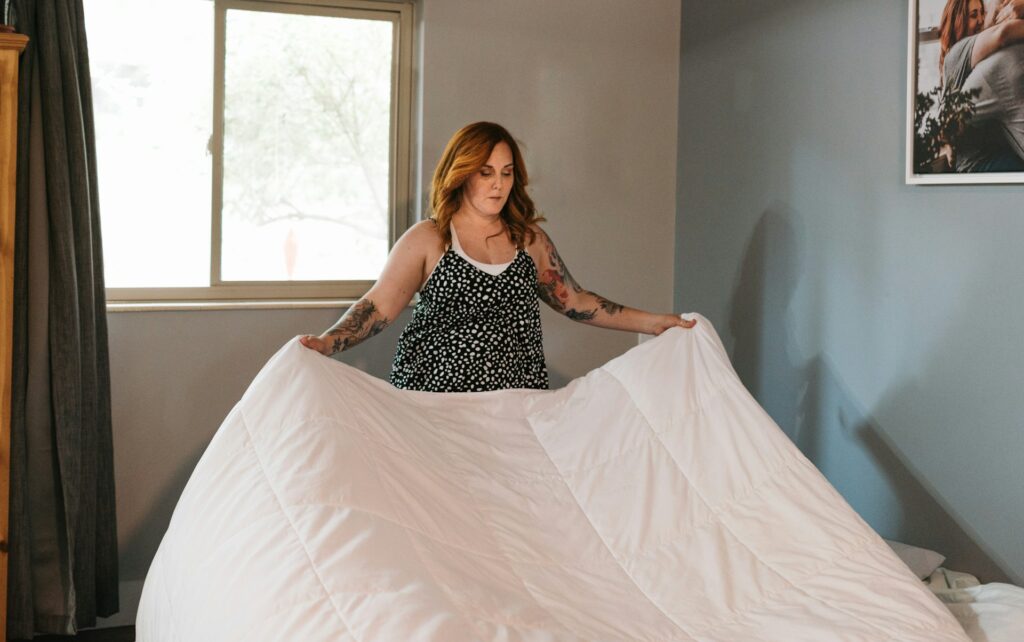Some days just feel a bit blah for no clear reason.

You’re not sure what triggered it, you can’t quite explain it, and trying to snap out of it only makes it worse. When you’re in that foggy space, the best thing isn’t always to analyse—it’s to calmly change the energy. Here are some low-pressure things that can help when you’re feeling low, but can’t put your finger on why.
1. Go outside for ten minutes (even if you don’t want to).

It doesn’t have to be a full-blown nature walk. Just stepping out the front door, feeling the air, and changing your environment even slightly can help. When your brain’s spiralling or your mood’s slumped, staying in the same spot only reinforces it. Something about fresh air, even when it’s grey or drizzly, breaks the loop. You might not feel instantly amazing, but your system gets a subtle reset. You moved. You looked at a tree. That counts.
2. Change the lighting.

If you’re sitting in harsh overhead light or near a gloomy corner, swap it. Turn on a lamp. Light a candle. Open a curtain. The tiniest lighting adjustment can change the whole mood of a room, and of your brain. We often underestimate how much our surroundings affect how we feel. Even just softening the space can take you out of that “everything’s wrong” feeling and into something a bit calmer and more manageable.
3. Drink a glass of water like it’s a magical potion.

It sounds silly, but when you feel off, your basic needs are usually part of the problem. Instead of mindlessly gulping water, slow down. Drink it like you’re giving your body something good. Make it feel like a small act of kindness. It’s a pause, a breath, and a bit of nourishment. You might not feel transformed, but it reminds you that you’re still in there, doing your best, even if all you managed today was hydration.
4. Put something away that’s been sitting out for too long.

Not a full clean. Not a big tidy. Just one thing. Put your mug in the sink. Fold that jumper that’s been on the chair for three days. Small physical actions can change mental energy surprisingly fast. You’re not going to fix your life through laundry. It’s about telling your brain, “I can do one thing.” When everything feels heavy, one thing is a start. Sometimes that’s all you need to prove you’re not stuck.
5. Put on music you liked as a teenager.

Not calming instrumental music. Not lo-fi focus beats. Something you genuinely loved when you were a bit chaotic and still figuring yourself out. The kind of music that made you feel things without knowing why. Nostalgia has a weirdly grounding effect. It reminds you of other versions of yourself—the ones that felt things deeply and survived it anyway. That connection can help you feel less alone in your own mind.
6. Talk to someone about absolutely nothing.

You don’t need a deep chat or a breakdown. Just message a mate something random. Send a meme. Say, “Did you see what happened on Bake Off?” Or ask a silly question like “Would you rather have forks for hands or spoons for feet?” Connection doesn’t have to be serious to help. Sometimes the most helpful thing is just being reminded that someone’s out there and the world hasn’t stopped turning, even if your mood has.
7. Move your body without calling it exercise.

Put on a song and stretch. Walk around your flat. Do a bit of bad dancing in the kitchen. It doesn’t need to be a workout—it just needs to interrupt the stuckness. Your body and brain are more connected than we realise. Movement shakes up the energy. It reminds your nervous system that you’re not frozen. Even two minutes of gentle moving can take you from “What is wrong with me?” to “Okay, maybe I’m not entirely broken.”
8. Give yourself a task you can finish in five minutes.

When everything feels foggy, starting something big is impossible. So don’t. Choose something ridiculously small. Reply to one email. Water your plant. Change your pillowcase. Something that gives you a little win. That tiny sense of completion builds momentum. Even if it doesn’t turn into anything bigger, you still did it. That’s more than nothing. That’s proof you still have some control, even on the meh days.
9. Watch or read something ridiculously low-stakes.

This is not the time for a gritty documentary or a self-help book. Pick something that’s silly, wholesome, or totally unserious. A cooking show. A kids’ film. A 2007 reality series where everyone had awful hair and fake tans. It gives your brain a break from trying to figure everything out. When your mood’s off, but there’s no reason, the last thing you need is more pressure to “solve” it. A little escapism can be just what you need.
10. Talk to yourself like you would on a good day.

Even if you’re not feeling it, say something kind—out loud if you can. “You’re allowed to feel off.” “You’ve felt like this before and come through it.” You don’t need to believe it fully. Just let it sit there. That voice might not drown out the inner critic immediately, but it plants a seed. It reminds you that you don’t always feel this way, and that version of you that knows how to cope is still around, even if a bit quiet today.
11. Take a nap without feeling guilty about it.

If you’re tired, rest. Don’t try to justify it or earn it. You don’t need to run three errands or power through a task list before lying down. Your body might just be low on everything—energy, serotonin, patience. A nap is not failure. Sometimes your brain just needs a soft reboot. Not everything has to be productive to be worthwhile. Give yourself permission to unplug without turning it into a big self-improvement project.
12. Let yourself cry (even if it’s just a little bit).

You don’t need a big, dramatic cry for it to count. Even a few tears can take the edge off. There’s no need to explain why you’re crying if you don’t know. Sometimes it’s just your body processing stuff you haven’t figured out yet. Holding it in doesn’t make it go away—it just makes you feel weirder. A short, quiet cry is like an emotional pressure release valve. It doesn’t fix everything, but it helps your system reset a bit.
13. Remind yourself this feeling doesn’t last.

It sounds cliché, but it’s true—no mood sticks around forever. This fog, this slump, this strange nothing-feeling? It’s not permanent either. The trick is to ride it out gently, not fight it like it’s a sign something’s broken. Low moods with no clear cause are frustrating, but they pass. You don’t have to figure them out in the middle of them. You just have to be kind to yourself until the weight lifts, even if you don’t know when that will be.


